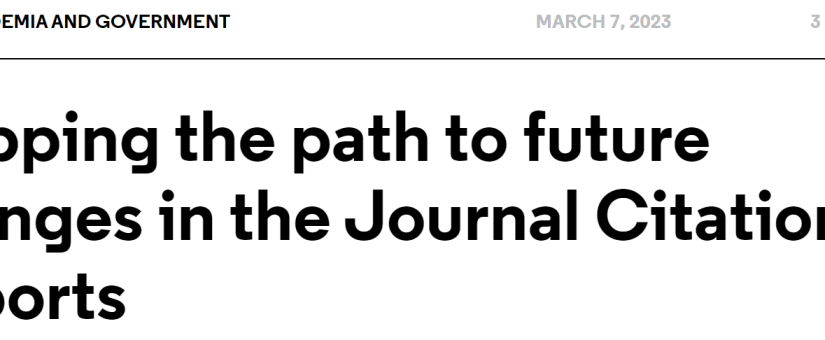
Changes in JCR 2023
As already announced last year, Clarivate Analytics announced on March 7 that they will be granting all journals in the Web of Science Core Collection an Impact Factor with the 2023 release. This means that more than 9,000 journals will get for the first time a Journal Impact Factor (JIF), whether they are indexed in the Arts and Humanities Citation Index (A&HCI) and on the multidisciplinar Emerging Sources Citation Index (ESCI). Therefore, the next release of the Journal Citation Report in June 2023 will contain 9,000 journals more, increasing from 12,000 journals to 21,000. Say, every journal on the Earth will have a JIF. More interested? Take a look at «The End of Journal Impact Factor Purgatory (and Numbers to the Thousandths),» The Scholarly Kitchen, 26 Jul 2022; “Ya se han anunciado grandes cambios en el JCR que se publicará en junio de 2023”, La Ciencia de la Mula Francis, 28 Jul 2022; and “Cambios importantes en Journal Citation Reports a partir de 2024”, Aula Magna 2.0, 21 Mar 2023.
What would these changes imply for researchers? What does it mean for research evaluations, promotion, or hiring committees? Is it time to embrace another way to evaluate research?
My university recently adhered to the Agreement on Reforming Research Assessment promoted by Coalition for Advancing Research Assessment (CoARA). You can read the full agreement here, but the basic message is to “basing assessment primarily on qualitative judgment, for which peer review is central, supported by responsible use of quantitative indicators.” Yes, great idea, of course! But I would definitively see for universities and national research agencies to take real steps, even small, to this direction. Now. Not in 4, 6 or 10 years. Right now!
The key commitments from the CoARA agreement are as follows:
- Recognise the diversity of contributions to, and careers in, research in accordance with the needs and nature of the research.
- Base research assessment primarily on qualitative evaluation for which peer review is central, supported by responsible use of quantitative indicators
- Abandon inappropriate uses in research assessment of journal- and publication based metrics, in particular inappropriate uses of Journal Impact Factor (JIF) and h-index .
- Avoid the use of rankings of research organisations in research assessment
I hope to see soon changes in my own university but especially in the national agencies in Spain (AEI, ANECA, etc) as main drivers of research assessment policies at national level. AEI, for example, adhered to the DORA declaration in April 2021 and, after 2 years, there are no visible changes yet in the research assessment, strongly dominated by JIF and quartiles. (By the way, JIF will be displayed in JCR 2023 to one decimal place which will result in more tied rankings).
- Posted by geoadmin
- On 25 March, 2023
- 0 Comments




0 Comments